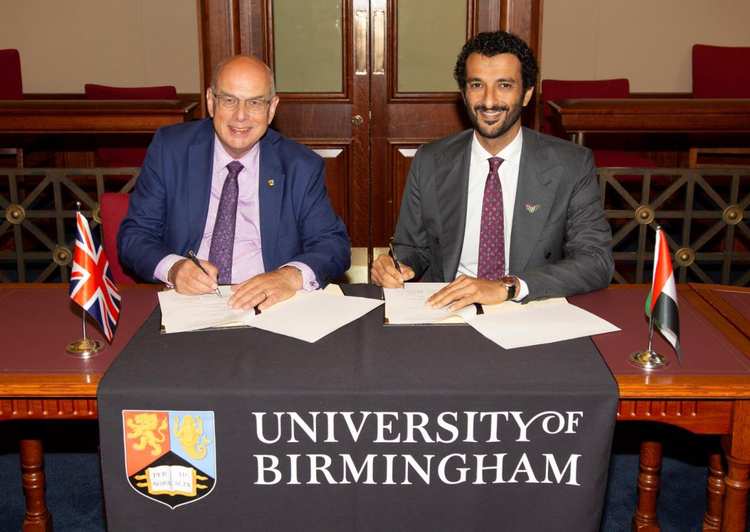University of Birmingham partners with UAE Ministry policymakers to support national growth

National policymakers are joining the University of Birmingham (@unibirmingham) in a major new research and evaluation partnership that will harness the University’s expertise supporting the economic growth of the UK’s West Midlands region.
The Ministry of Economy of the United Arab Emirates and the University of Birmingham, in the UK, have signed an agreement that will see the partners develop ways of using economic data and analytics to help develop policies that support the UAE’s growth.
Strengthening UK-UAE links and supporting UK-UAE Business Council aspirations, the partnership will create innovative tools and analysis for policy measures as well as a pipeline of talent and training for the UAE, through PhDs and post-doctoral fellowships.
As part of the collaboration agreement, the Ministry and the University will set up a senior joint working group to identify priorities areas for projects and work to deepen and expand the partnership.
Minister of Economy H.E. Abdulla Bin Touq Al Mari was joined by Ambassador H.E. Mansoor Abulhoul and met Professor Sir David Eastwood, Vice-Chancellor of the University of Birmingham.
The visit began with a tour of The Exchange hosted by the Provost, Professor Tim Jones. The Exchange is the University’s new city centre engagement hub and a portal for connecting academics and students with the West Midlands’ region’s businesses and entrepreneurs, policy makers and the public. The delegation then moved to the Edgbaston campus, where Minister and Vice-Chancellor signed the collaboration agreement before meeting senior academics for discussions under the theme of emerging sectors for economic growth (energy, AI, smart infrastructure and transport, Quantum Technologies).
H.E. Abdulla Bin Touq Al Mari commented
“As the UAE prepares to celebrate its 50th anniversary, this partnership forms part of our vision for the next 50 years. It brings the UAE and UK closer together in our support of excellence in education and global prosperity.”
The partnership will build an exchange of knowledge and talent based around economics linked to national growth policies – founded on the expertise of the University’s City Region Economic and Development Institute (City REDI). The collaboration academic lead will be Professor Raquel Ortega-Argilés, Chair in Regional Economic Development.
Professor Sir David Eastwood, Vice-Chancellor of the University of Birmingham, commented: “The University of Birmingham has a wealth of economic knowledge and research expertise that has proved invaluable to the growth of the UK’s West Midlands region. I am delighted that our business experts are supporting the UAE through this exciting new partnership.
“City-REDI, established and led by Professor Simon Collinson, has built a distinctive international research platform through the development of a Birmingham approach to understanding and empowering growth in city regions. This systemic approach to supporting regional economies will undoubtedly help to develop future policies that support the UAE’s national growth.”
City REDI was established in 2015 and, together with its younger ‘sister’ West Midlands Regional Economic Development Institute (WM REDI), has seen more than £15 million invested to create integrated research and policy approaches which help policymakers tackle a range of multidisciplinary issues relating to regional growth.
The University of Birmingham has been delivering undergraduate and postgraduate education in Dubai for three years and is opening its iconic major new campus this autumn, which together with its UK counterpart will create the world’s smartest campus.
ENDS
PHOTO CAPTIONS – please credit :
For more information please contact Tony Moran, International Communications Manager, University of Birmingham – [email protected] or +44 (0)7827 832312, or contact the press office on +44 (0) 7789 921 165 or [email protected]
Notes to Editors:
- The University of Birmingham is ranked amongst the world’s top 100 institutions. Its work brings people from across the world to Birmingham, including researchers, teachers and more than 6,500 international students from over 150 countries.











Responses